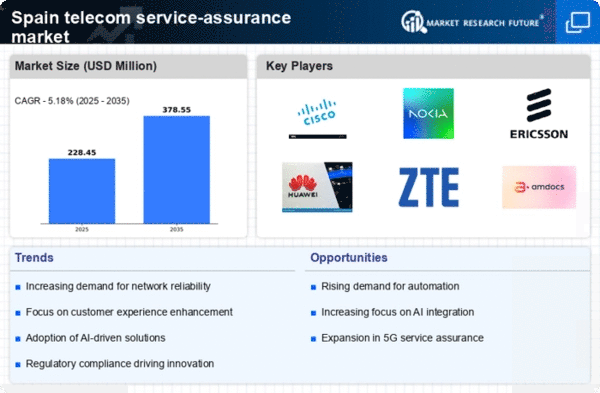Emergence of 5G Technology
The rollout of 5G technology in Spain is poised to transform the telecom service-assurance market. With its promise of ultra-low latency and high-speed connectivity, 5G is expected to create new opportunities and challenges for telecom operators. The deployment of 5G networks requires advanced service-assurance solutions to monitor and manage the complex network environments effectively. As of November 2025, 5G coverage is projected to reach 50% of the population, driving the need for enhanced service quality assurance. This transition necessitates the implementation of sophisticated analytics and monitoring tools to ensure that service levels are maintained. Consequently, the telecom service-assurance market is likely to experience substantial growth as operators adapt to the demands of 5G technology.
Increased Mobile Data Consumption
The surge in mobile data consumption in Spain significantly influences the telecom service-assurance market. With the proliferation of smartphones and mobile applications, data traffic has escalated, leading to a need for robust service-assurance mechanisms. Reports indicate that mobile data traffic in Spain is expected to grow by 30% annually, necessitating enhanced monitoring and management of network performance. Telecom operators are increasingly adopting service-assurance solutions to ensure optimal performance and reliability of mobile services. This trend not only helps in maintaining service quality but also in reducing operational costs associated with service disruptions. As a result, the telecom service-assurance market is likely to expand as operators seek to address the challenges posed by rising mobile data demands.
Regulatory Compliance and Standards
Regulatory compliance plays a crucial role in shaping the telecom service-assurance market in Spain. The government has established stringent regulations aimed at ensuring service quality and consumer protection. Telecom operators must adhere to these regulations, which often require the implementation of comprehensive service-assurance frameworks. As of November 2025, compliance with these standards is not only a legal obligation but also a competitive differentiator. Operators that invest in robust service-assurance solutions are better positioned to meet regulatory requirements and enhance customer trust. This focus on compliance is likely to drive growth in the telecom service-assurance market, as operators seek to avoid penalties and improve their service offerings.
Shift Towards Cloud-Based Solutions
The shift towards cloud-based solutions significantly impacts the telecom service-assurance market in Spain. As telecom operators increasingly migrate their operations to the cloud, there is a growing need for service-assurance tools that can operate effectively in cloud environments. This transition allows for greater scalability and flexibility, enabling operators to respond swiftly to changing market demands. By November 2025, it is estimated that over 60% of telecom services will be delivered through cloud platforms, necessitating the adoption of cloud-compatible service-assurance solutions. This trend indicates a potential for innovation and efficiency in service delivery, thereby driving the growth of the telecom service-assurance market as operators seek to leverage cloud technologies.
Rising Demand for High-Speed Connectivity
The increasing demand for high-speed connectivity in Spain is a primary driver for the telecom service-assurance market. As consumers and businesses alike seek faster internet speeds, telecom operators are compelled to enhance their service quality. This demand is reflected in the growing number of fiber optic connections, which reached approximately 80% of households in 2025. Consequently, telecom service-assurance solutions are essential for ensuring that service levels meet customer expectations. The market is projected to grow at a CAGR of 10% over the next five years, driven by the need for reliable and high-speed internet services. This trend indicates that telecom operators must invest in advanced service-assurance technologies to maintain competitiveness and customer satisfaction.
















